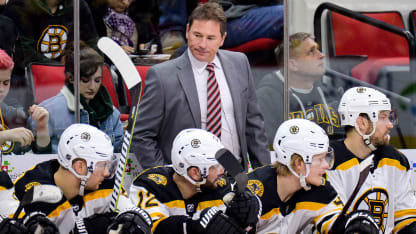BOSTON - When Bruce Cassidy took over behind the Bruins bench last February, 13 long years had passed since he was last at the helm of a National Hockey League club.
In the time between his year-plus stint with the Washington Capitals and his ascension to head coach of the Black & Gold - which included eight years with Providence - Cassidy admits to plenty of personal and professional growth.
Cassidy Credits Mix of Vets, Rookies for B's Success
Bench boss honored to be one of three finalists for Jack Adams Award

"In 15 years, you should change, hopefully for the better," said Cassidy. "That's the idea. I've said all along, when you become a parent, it changes a lot of how you think and how you interact with people as well, how you teach and how you communicate with players.
"And then for me, just being comfortable in your own skin here. Since Day 1, I was, and that has a lot to do with being in the organization for nine or 10 years, you're around these guys, so you see them as people, not just as these high-end hockey talents."
Cassidy's development - both in the rink and away from it - has no doubt been a critical reason why he's had so much success as Boston's bench boss in such a short period of time. The 52-year-old has posted a 68-28-13 record during his tenure, leading Boston to the postseason in each of the last two campaigns.
The Bruins' 50-20-12 record in 2017-18 was the second-best mark in the Eastern Conference and fourth-best in the NHL. And for his efforts during Boston's remarkable run, Cassidy was named on Wednesday night a finalist for the Jack Adams Award, presented annually to the coach "adjudged to have contributed the most to his team's success." Colorado's Jared Bednar and Vegas' Gerard Gallant are the other two finalists.
"I was honored," said Cassidy. "I'm still new at this, for the most part. For me, it is an honor. I think it's obviously a reflection of the entire staff and the work they've put in and the team on the ice. But it is nice to be recognized among your peers.
"I'm new at it. Maybe in 15 years it won't mean as much because you've been around. But when you're still trying to establish yourself, it's a nice recognition."
It is not an accolade that the Ottawa native and former first-round pick of the Chicago Blackhawks could have envisioned when he got the job.
"It's certainly not something you think about everyday," said Cassidy. "Last year I was just focused on doing a good job and then getting a job permanently and then building a culture where we're going to be in the mix every year with a chance for the Stanley Cup. And we've started there. We're in the mix. We were in the mix last year, we're in the mix this year. We want to keep building on that."
One of the major reasons why the Bruins are in the mix is the performance of their young players, many of whom Cassidy has helped groom both in Boston and during his time in Providence.
Boston ranked first in the NHL this season with 58 rookie goals, with Jake DeBrusk, Matt Grzelcyk, Danton Heinen, Sean Kuraly, and Charlie McAvoy all becoming regular contributors.
But it was also the work of the Bruins' seasoned core - the likes of David Backes, Patrice Bergeron, Zdeno Chara, and David Krejci - that helped bring everything together.
"The young part, you're used to that in the American Hockey League," said Cassidy, who coached the P-Bruins from 2008-16, the last five as head coach. "You're trained to develop young talent, so to me that's fairly straightforward from experience...you come here and it was a natural, 'Are the [veteran] players going to be receptive?' That's always the thing because they're here to play and play well and be counted on. In the American League it just goes with the job description.
"Guys like Bergy and Krech that were going to play with young wingers and Zee on the back end, [Adam] McQuaid and [Kevan] Miller, David Backes - you need them to buy into it and they have.
"The reason we're good this year and the reason I think the kids have developed well, a lot of the credit has to go to the core and the veterans in this locker room."
Cassidy, fourth in Bruins history with a .683 winning percentage, also credited the team's veterans for helping him create a new environment and culture throughout the organization.
"They carried the same message. When we're up there as a coaching staff talking about the process and starting on time and not just always worrying about the end result and where we're going, how we need to play," said Cassidy.
"It's easy when you're winning to say that message. But what happens during adversity? Are you on board? Are we in it together? And they are, they're great people.
"I've said that since the day I got the job on the interim basis and the day I got hired full time - I'm very fortunate. We have a great core, great character guys and that makes my job easier."


















